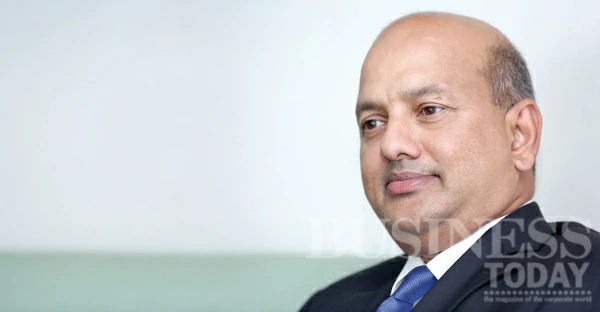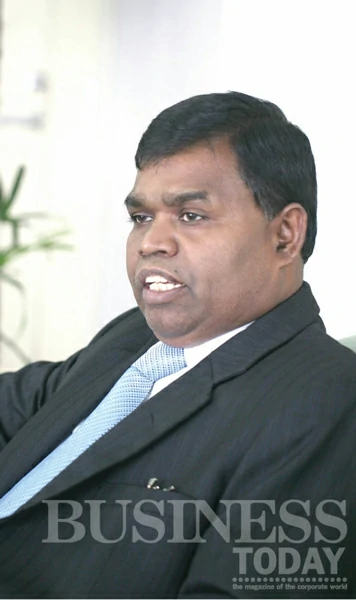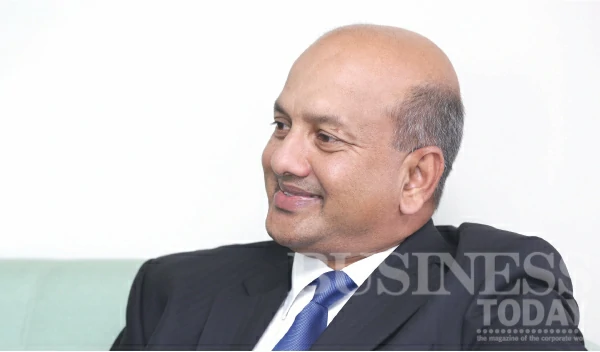
Bank of Ceylon is always associated with strength and stability. This is not only because the Bank of Ceylon (BoC) tower was the first high rise building in the country but also because it was the first bank to be established in Sri Lanka. With a history spanning 75 years BoC has been the pioneer in many areas. It is the only bank to have a customer base that spreads across all areas and all segments of society. As it enters an era of transformation with its new Chairman, Air Chief Marshal Harsha Abeywickrama who brings a diverse set of skills and experience and General Manager/Chief Executive Officer, D M Gunasekara who has been with BoC for over 30 years, the country can expect many great things from this banking giant.
By Udeshi Amarasinghe
Photography Mahesh Bandara and Indika De Silva
Bank of Ceylon is celebrating 75 years this year. Can you elaborate of the journey of the bank during these years?
Chairman: I was appointed to this position recently, however BoC has a superior history in Sri Lanka’s financial sector. BoC was the first bank that was established by the British in Sri Lanka and we are also the first to have an overseas branch, which is also in the UK. We currently have the largest customer and asset base with 11 million customers and a one trillion rupee asset base. The Bank has come a long way considering that we were the first high rise building in the country.
We have been participating in the development drive of the country in a major way. Even during the war we supported development and we will continue to do so in the future as well.
GM: BoC was established as a private bank in 1939 and was nationalised in 1961. At that time the focus was to provide finance to the export crop sector comprising of tea, rubber and coconut. That is the reason why the first overseas branch was established in London in 1949, to facilitate the tea auctions. Under the Agricultural Productivity Law enacted in 1972, Agrarian Service Centres were set up Island-wide. As a result the branch network expanded rapidly covering most of the rural areas of the Island. Introduction of the open economic policies in 1977 ushered in a new era in commercial banking in Sri Lanka.
With consolidation, BoC has 617 branches, and 14 SME centres in Sri Lanka. In addition to that we have branches in the Maldives, Chennai, India, Seychelles and our subsidiary in London. During this 75 year journey we have gone through many changes. Earlier we were a commercial bank, but today we play a dual role; development and commercial. However, we are geared more towards development activities such as agricultural and industries where we are focusing on the SME and enterprise development sector in Sri Lanka.
Can you elaborate on how Bank of Ceylon is contributing to the various economic sectors of the country?
GM: BoC plays a very big role in the economic development of the country as we contribute to the funding of mega projects such as infrastructure, ports, airports, roads, telecommunication, power and energy. Furthermore, through our branches we are assisting the agriculture, industry and SME sectors.
In The Past BoC Has Had A Monopoly Being A State Bank In Certain Sectors. However, With The End Of The War There Is Greater Competition In This Industry And We Have To Look At Ways In Which We Can Work With The Private Sector.
Off shore banking sector, FDI and remittances are important areas for the Bank as well. Over seven billion rupees worth of remittances come into Sri Lanka and more than 50 percent of that is through BoC. In addition to our four branches and subsidiary overseas, we have 800 correspondent banks and more than 70 representatives working around the world. We are all looking at ways in which we can bring in foreign currency into the country. All these funds will be allocated for development.
As the newly appointed Chairman, what are your plans for BoC?
Chairman: BoC has an excellent workforce that is very talented. We have good systems and procedures in place. However, what we need to do is focus on technology, as we are somewhat behind. The world is moving rapidly in terms of introducing new technology in banking such as internet banking, tele banking, document transfer and other core banking systems. We have to ensure that the customer is the focal point in whatever we do. We should not wait for the customer to come to us, we should go out and seek customers.
BoC has enormous potential. We have already started on a restructuring programme and the results will be seen in 12-14 months. We have some deliverables planned and our strategic plan is already in place. We have many plans where we will focus on areas that are lacking and we will reach heights where no one else can come close to us in this sector.
BoC is the main state bank and is considered traditional. How are you going to change that perception?
Chairman: As a state bank we are unique in our organisation structure and culture, that does not mean we have to change that. It is a strength though some may look at it as a weakness. We cater to a very different market as an authentic Sri Lankan bank. We are already strong in the villages, at grass root level. We have always been the bank to go to any village or town first. We train the people on banking and it is afterwards that other banks come and takeover.
Of course we have to change our outlook, train our staff on PR and how to deal better with customers. In the past BoC has had a monopoly being a state bank in certain sectors. However, with the end of the war there is greater competition in this industry and we have to look at ways in which we can work with the private sector.
GM: the perception is that BoC is 75 years old and it is a traditional bank. We are continuously developing new strategies and the average age of our staff is 35. In the next couple of years we will be the youngest bank. Furthermore, looking at our customer base, human resources and steps that we have taken to introduce new technologies we will be the number one brand not only in Sri Lanka but also in Asia.
Will we see BoC further expanding overseas?
Chairman: Due to His Excellency President Mahinda Rajapaksa’s forward thinking we were able to open a branch in Seychelles. The response was very good and we were able to see potential and opportunities in that country during our recent visit. We are opening a gateway to Africa.
Furthermore, Looking At Our Customer Base, Human Resources And Steps That We Have Taken To Introduce New Technologies We Will Be The Number One Brand Not Only In Sri Lanka But Also In Asia.
This will give us a chance to look at opening branches in other African countries as well.
We will be opening two more branches in India and we are also looking at Middle Eastern and GCC countries.
The global environment is constantly fluctuating, which has an effect on the Sri Lankan banking sector as well. How do we ensure stability in our system?
GM: During the last five years we did feel the impact of the volatility of the US and European markets, but we survived. We do not use sophisticated banking instruments and we do mainly secured banking transactions. We are a small country and our regulators are consistent. Therefore, we do not have much pressure on our systems. We have good capital and we are organised, as such our risk is not that great.
BOC was one of the first Sri Lankan banks to issue foreign currency bonds. What was the response to that and will we see further foreign currency bonds being issued?
GM: When we issued our first foreign bond we were surprised because it was over subscribed six to eight times. We are also receiving many requests from foreign banks and they are happy to work with us. We have not decided yet whether we will have any more foreign bond issues in the near future.
If you look at the overall strategies of the government, consolidation of the banking and finance sector has been seen as a positive development in ensuring a stable and strong system in Sri Lanka. What are your thoughts on that?
GM: It is a good thing because then the institutions become stronger. Bank of Ceylon has a few subsidiaries, which will be consolidated.
How can we make BoC more customer centric?
Chairman: BoC is actually customer centric that is very much apparent from the large customer base that we have. If you look at any branch of another bank they may have 25 people at the branch on a particular day but we will have 250 with almost the same number of staff. We are looking at introducing new technology and easy queuing systems to make the procedures more efficient and fast. We are in the process of restructuring. It is also a coincidence that during this period of transformation that I have come in as the new Chairman and we have also acquired the expertise of a few consultants. We are confident that the measures we are taking today will take us on a journey beyond 75 years.
The Country Can Now Move Forward As We Have Achieved Peace And Freedom. This Is Because His Excellency President Mahinda Rajapaksa Was Determined To End The War.
GM: As a national bank we have a duty to serve all our customers and the people of this country. We are not selective about customers. We cater to farmers, fishermen, to SMEs, businesses, pensioners, government servants and all segments. We are very diverse and we cater to a larger number of people than any bank. The benefits are greater. We are the only bank that provides services to the poorest and the richest person in the country.
Chairman if you can tell us a little bit about yourself, you come from a very different field?
First of all I am very happy that I got this job following my retirement from the Air Force, after serving as its Commander. As a person I always want to work for the country. I served during the conflict and at the Air Force where I was risking my life. This is different, but it is also a place where I am working for the country. If I had decided to work for a private organisation or a multinational then it would be a specific person or a group of people that would be benefitting. Therefore, I always believe in giving something back to the country. I am a very patriotic person. I will be able to utilise the leadership training received and the exposure in various fields to fulfill my responsibilities at the BoC.
My career started as a fighter pilot and we grew up with the war. We faced many problems, which were not financial issues but life and death issues. The risks that we were taking cannot be compared to any other field because we were not working with money but with lives. And decisions taken would have an effect on the security and the future of the country. As the Director of Operations I was responsible for all air operations, which were crucial for the ground forces to move forward. I gained much experience in management and taking decisions quickly.
My appointment as the Commander of Air Force gave me an exposure in many fields and I have had training with some of the best Air Forces in the world. I have certain academic qualifications as well. I feel that I bring in some new ideas into this organisation because I come from a different field and we will be able to achieve the objectives that we have set for BoC.
The country can now move forward as we have achieved peace and freedom. This is because His Excellency President Mahinda Rajapaksa was determined to end the war. Furthermore the direction and the guidance that we received from Defence Secretary Gotabaya Rajapaksa were crucial for the victory. He brought together all the Forces to work towards one aim.
The government is moving in the right direction in terms of development and ensuring the security and stability of the country. The President has a good vision and there are key figures in the government that are making the right decisions for the country. We are here to support the decisions made. We have already seen many positive developments in our economic indicators and the country is moving on an upward trajectory.
The Direction And The Guidance That We Received From Defence Secretary Gotabaya Rajapaksa Were Crucial For The Victory. He Brought Together All The Forces To Work Towards One Aim.
General Manager you have been at BOC from the beginning of your career. Can you tell us about your rise to this position?
Following the completion of my degree I joined the university for a brief period as an assistant lecturer. Then I joined BoC as a Management Trainee, 30 years ago. I was able to get exposure in all sections of banking including rural banking, international, off shore, corporate and retail banking. With the experience I have, I am able to deal with any issue that may arise in the Bank. I have worked in various places around the country as well as internationally and with different customers, therefore I know the customers’ needs and how we can serve them better. My staff are very good and easy to work with. I enjoy serving the people and this country.
Final thoughts?
Chairman: This bank is the number one bank and number one brand in the country and we will continue to reach greater heights. We are very confident because we have the best staff and also the best General Manager in the banking sector.
GM: We have made many plans to introduce change to internal processes, external appearance, technological advancement, staff education and customer service. We will continue to be the number one bank and brand in the country. With the 75th anniversary we want to change the bank and take it to a new dimension where will definitely do better than we are today.







